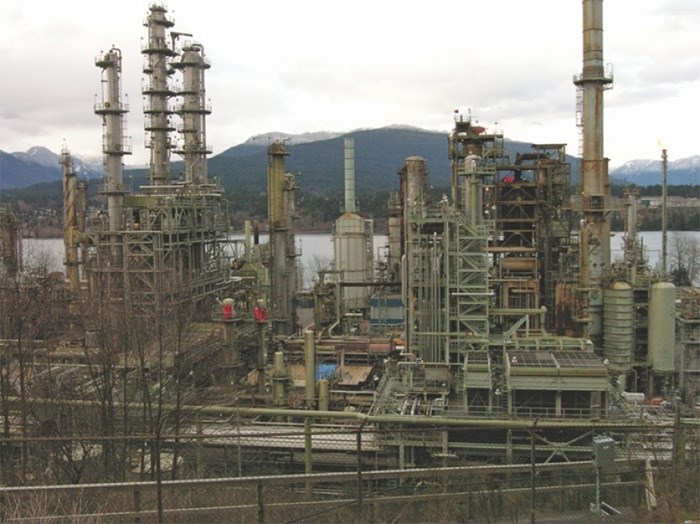 Metro Â鶹´«Ă˝Ół»will remain home to Canada’s highest gas prices. Burnaby’s Parkland Fuel refinery is one of only two refineries left in B.C.?|?BIV archives
Metro Â鶹´«Ă˝Ół»will remain home to Canada’s highest gas prices. Burnaby’s Parkland Fuel refinery is one of only two refineries left in B.C.?|?BIV archives
Lower Mainland drivers will pay roughly $0.14 per litre more for gasoline this year, according to a petroleum analyst for GasBuddy, and it’s not just because of a $5-per-tonne increase in the carbon tax coming in April.
Â鶹´«Ă˝Ół»and Victoria will continue to have the highest gasoline prices of 22 Canadian cities, according to GasBuddy’s 2018 forecast.
As of last week, gas prices in the Lower Mainland were around $1.35 per litre. The 2018 outlook forecasts daily average highs for Â鶹´«Ă˝Ół»of $1.46 to $1.52 per litre – the highest of the 22 Canadian cities in the GasBuddy outlook.
Victoria is second-highest, with daily average highs of $1.38 to $1.44 per litre predicted.
When the carbon tax increases by $5 per tonne in April, it will add $0.01 to the price of gasoline in B.C.
In total, British Columbians will pay $0.08 per litre in carbon taxes, come April. Lower Mainlanders also pay an additional transit levy on gasoline, which is why gasoline prices are lower in Abbotsford, which is outside the Metro Â鶹´«Ă˝Ół»transit region.
“If you compare your taxes, when that [carbon tax increase] comes into place on April 1, that puts your taxes almost firmly in the $0.50 range,” said Dan McTeague, a petroleum analyst for GasBuddy. “The next runner-up would be Quebec – Montreal – which would be in the $0.43 range.”
But it’s not just taxes that result in Â鶹´«Ă˝Ół»having the highest gasoline prices of Canada’s major cities.
“It’s a combination of higher taxes and the inability to have our own regional sufficient supply of fuel produced in our own backyard,” McTeague said.
B.C. once had seven refineries. It’s now down to two: the Parkland Fuel Corp. (TSX:PKI) refinery in Burnaby (formerly owned by Chevron) and a small Husky Energy (TSX:HSE) refinery in Prince George.
“You are now reaping a very bitter harvest when it comes to fuel prices,” McTeague said.
The Parkland Fuel refinery in Burnaby, which will undergo a $100 million upgrade, supplies about 40% of the Lower Mainland’s gasoline, McTeague said, with another 40% coming from Alberta refineries via the Trans Mountain pipeline.
Between 10% and 20% of the Lower Mainland’s gasoline comes from refineries in Washington state, which adds a premium to gas prices of $0.15 to $0.16 per litre.
There have been a number of refinery proposals for B.C., including B.C. newspaper mogul David Black’s proposed Kitimat Clean.
McTeague said there is a demand for additional refining capacity in B.C. He just doesn’t think any new refineries will ever be built here.
“The margins are there, make no mistake, which is why I think Parkland’s purchase from Chevron was a brilliant stroke by them, and why they’ve come from virtually nowhere to become one of the largest midstream operators in Canada,” he said.
Building a new refinery is a whole different story, however.
“You can’t do these things in an environment where there is so much unpredictability in terms of how regulators would answer this,” McTeague said. “Canada’s regulatory process is slower than molasses in January and, as a result, by the time you got around to doing this, the market may have shifted. Capital would move somewhere else.”
With demand for gasoline in the U.S. remaining robust, global oil prices moving up, local refining staying scarce and taxes rising, Â鶹´«Ă˝Ół»is permanently stuck with some of the highest gasoline prices in Canada, he said.
“Unless someone’s going to suddenly develop a brand new pipeline to bring in more gasoline from Edmonton or build a new refinery overnight, look for highest prices to be the law in Vancouver.”


